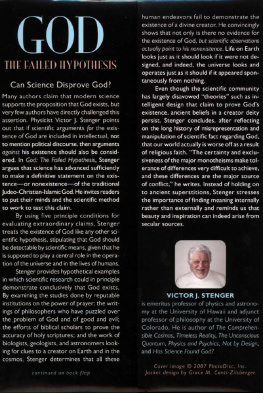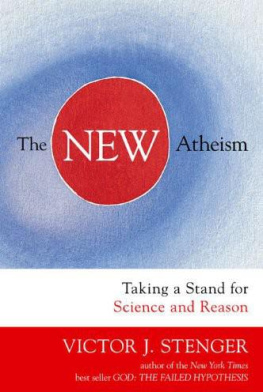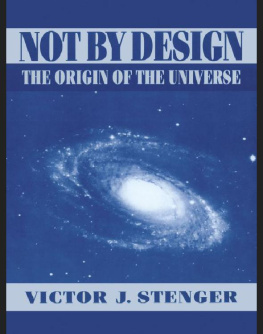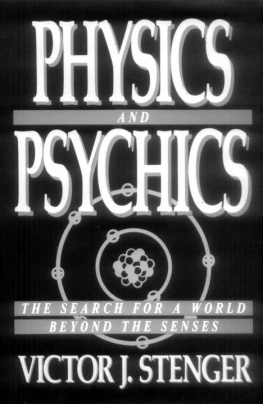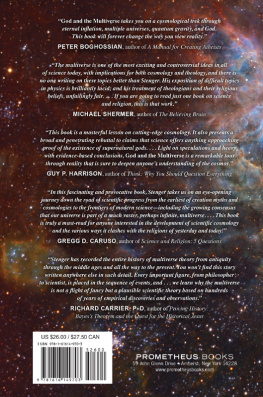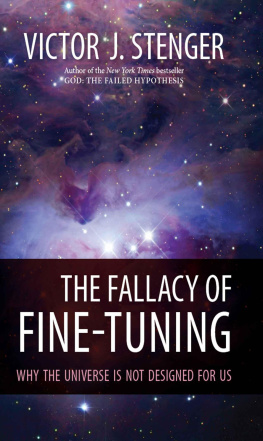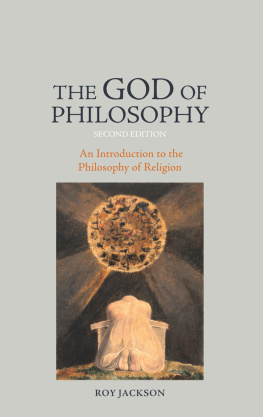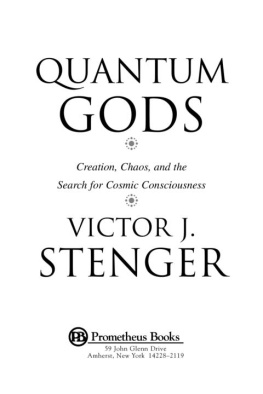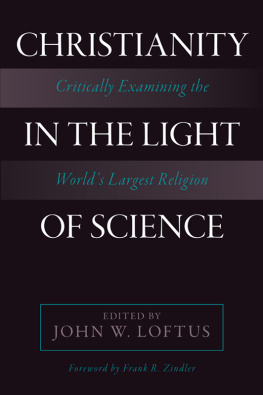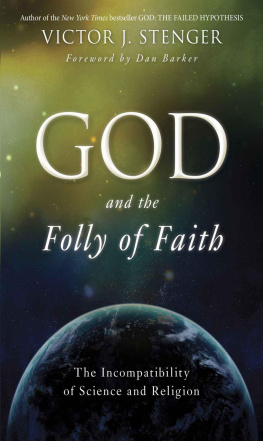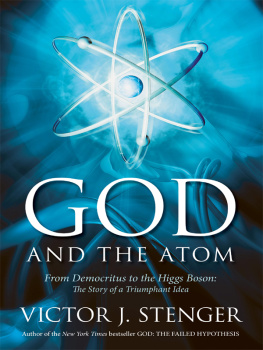God: The Failed HypothesisHow Science Shows That God Does Not Exist. Copyright 2007 by Victor J. Stenger. All rights reserved. No part of this publication may be reproduced, stored in a retrieval system, or transmitted in any form or by any means, digital, electronic, mechanical, photocopying, recording, or otherwise, or conveyed via the Internet or a Web site without prior written permission of the publisher, except in the case of brief quotations embodied in critical articles and reviews.
Inquiries should be addressed to Prometheus Books 59 John Glenn Drive Amherst, New York 14228-2197 VOICE: 716-691-0133, ext. 207 FAX: 716-564-2711 WWW.PROMETHEUSBOOKS.COM
11 10 09 08 07 5 4 3 2
Library of Congress Cataloging-in-Publication Data
Stenger, Victor J., 1935
God : the failed hypothesis : how science shows that God does not exist / Victor J. Stenger.
p. cm.
Includes bibliographical references and index.
ISBN 978-1-59102-481-1 (alk. paper)
1. Religion and science. 2. GodProof. 3. Atheism. I. Title.
BL240.3.S738 2007 212'. 1 dc22
2006032867
Printed in the United States of America on acid-free paper
TABLE OF CONTENTS
ACKNOWLEDGMENTS
As with my previous books, I have benefited greatly from comments and corrections provided by a large number of individuals with whom I communicate regularly on the Internet. I am particularly grateful for the substantial suggestions provided by Bill Benson, Celel Berker, Eleanor Binnings, Richard Carrier, Lawrence Crowell, Yonathan Fishman, Joseph Hilbe, James Humpreys, Ludwig Krippahl, Andrew Laska, Justin Lloyd, Ken MacVey, Don McGee, Brent Meeker, Anne O'Reilly, Loren Petrich, Kerry Regier, John Syriatowicz, Phil Thrift, George Tucker, Ed Weinmann, Roahn Wynar, and Bob Zanelli.
I must also acknowledge the support and valuable comments provided to me by Jeff Dean of Blackwell Publishing and his three anonymous reviewers. I have implemented many of their suggestions in this manuscript.
And, as with my previous books, I have enjoyed the support of Paul Kurtz and Steven L. Mitchell and their dedicated staff at Prometheus Books.
Of course, none of my work would be possible without the help and encouragement of my wife Phylliss and our two children.
PREFACE
The sciences do not try to explain, they hardly even try to interpret, they mainly make models. Bya model is meant a mathematical construct which, with the addition of certain verbal interpretations, describes observed phenomena. The justification ofsuch a mathematical construct is solely and precisely that it is expected to work..
John von Neumann1
VIEW FROM THE SIDELINES
Throughout history, arguments for and against the existence of X God have been largely confined to philosophy and theology. In the meantime, science has sat on the sidelines and quietly watched this game of words march up and down the field. Despite the fact that science has revolutionized every aspect of human life and greatly clarified our understanding of the world, somehow the notion has arisen that it has nothing to say about a supreme being that much of humanity worships as the source of all reality.
In his 1999 book, Rocks of Ages, famed paleontologist Stephen Jay Gould referred to science and religion as two "non-overlapping magisteria," with science concerning itself with understanding the natural world while religion deals with issues of morality.2 However, as many reviewers pointed out, this amounted to a redefinition of religion as moral philosophy. In fact, most religions do more than simple moralizing but make basic pronouncements about nature, which science is free to evaluate. Furthermore, science has an obvious role in the study of physical objects, such as the Shroud of Turin, which may have religious implications. And, why can't science consider moral issues, which involve observable and sometimes even quantifiable human behavior?
In a poll taken in 1998, only 7 percent of the members of the US National Academy of Sciences, the elite of American scientists, said they believed in a personal God.3 Nevertheless, most scientists seem to prefer as a practical matter that science should stay clear of religious issues. Perhaps this is a good strategy for those who wish to avoid conflicts between science and religion, which might lead to less public acceptance of science, not to mention that most dreaded of all consequenceslower funding. However, religions make factual claims that have no special immunity from being examined under the cold light of reason and objective observation.
Besides, scientific arguments for the existence of God, that is, arguments based on observations rather than authority, have been made since ancient timesas early as 77 BCE by Marcus Tullius Cicero (d. 43 BCE) in his work De Natura Deorum (On the Nature of the Gods).4 Particularly influential was William Paley (d. 1805) with his Natural Theology or Evidences of the Existence and Attributes of the Deity Collected from the Appearance of Nature, first published in 1802.5 In more recent years, theologians and theistic scientists have begun looking to science to provide support for their beliefs in a supreme being. Many books have been published purporting that modern theoretical and empirical science supports the proposition that God exists, and the popular media have been quick to promulgate this view.6 Very few books or media stories have directly challenged that assertion. But if scientific arguments for the existence of God are to be allowed into intellectual discourse, then those against his existence also have a legitimate place.
In my 2003 book, Has Science Found God? I critically examined the claims of scientific evidence for God and found them inadequate.7 In the present book, I will go much further and argue that by this moment in time science has advanced sufficiently to be able to make a definitive statement on the existence or nonexistence of a God having the attributes that are traditionally associated with the Judeo-Christian-Islamic God.
We now have considerable empirical data and highly successful scientific models that bear on the question of God's existence. The time has come to examine what those data and models tell us about the validity of the God hypothesis.
To be sure, the Judeo-Christian-Islamic God is not well defined. Not only do different views of God exist among these faiths, but also many differences can be found within each faith itselfbetween theologians and lay believers as well as from sect to sect. I will focus on those attributes of the God that the bulk of believers in each of these varied groups worship. Some of these attributes are also shared by the deities of religions outside the three great monotheisms.
I am well aware that sophisticated theologians have developed highly abstracted concepts of a god that they claim is consistent with the teachings of their faiths. One can always abstract any concept so it is out of the realm of scientific investigation. But these gods would not be recognized by the typical believer.
In the three monotheisms, God is viewed as a supreme, transcendent beingbeyond matter, space, and timeand yet the foundation of all that meets our senses that is described in terms of matter, space, and time. Furthermore, this God is not the god of deism, who created the world and then left it alone, or the god of pantheism, who is equated with all of existence. The Judeo-Christian-Islamic God is a nanosecond-by-nanosecond participant in each event that takes place in every cubic nanometer of the universe, from the interactions of quarks inside atomic nuclei to the evolution of stars in the most distant galaxies. What is more, God listens to every thought and participates in each action of his very special creation, a minute bit of organized matter called humanity that moves around on the surface of a tiny pebble in a vast universe.
Next page
